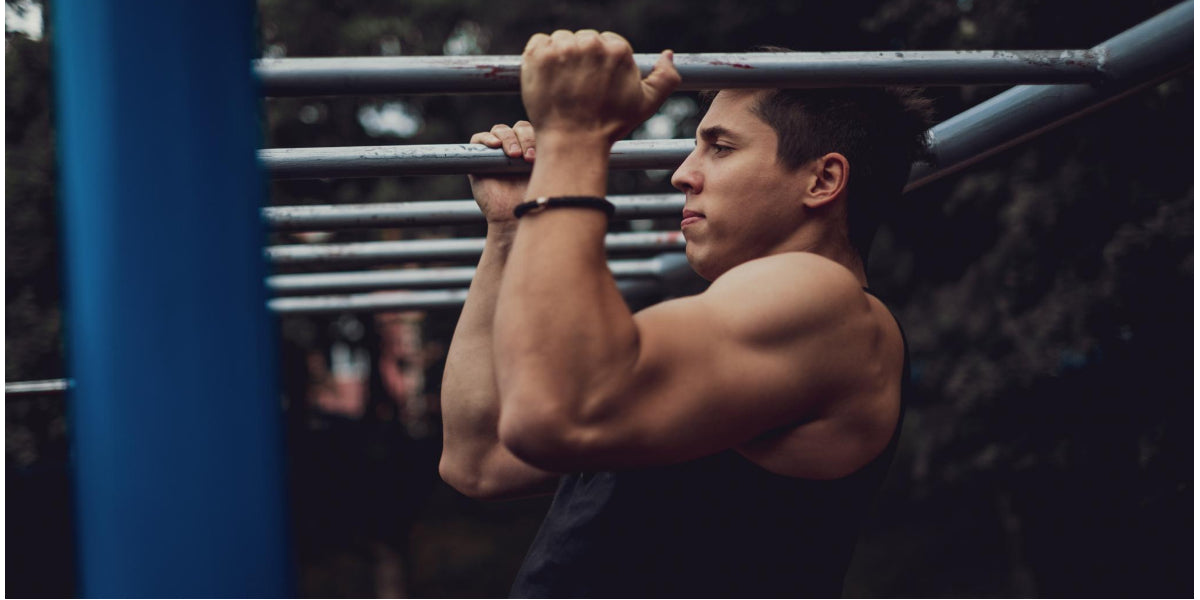Both chin-ups and pull-ups use a pull-up bar and your body weight for building upper body muscles. They are visually similar, making some people use the two terms interchangeably. Whilst this is so, each exercise targets different muscles.
Chin-ups are commonly used to target the biceps and pecs. However, should you want to engage your lats and traps, consider pull-ups!
Chin-Up vs Pull-Up: Which One is For You?
Research and studies have shown that both exercises increase muscle mass in the upper body. However, the main difference between these two is your hand grip and placement. When performing a chin-up, you hold with your underhand, with your palm (supinated grip) facing toward you. For a pull-up, grasp overhand, with your palm (pronated grip) facing away from your chin.
Do chin-up exercises when you want to primarily develop the biceps, posterior deltoid, or basically, the arms and back muscles. This also increases core strength for solid and toned abs, helping you lose belly fat in the process.
On the other hand, pull-ups can be more challenging, especially when you are a beginner. This is because pull-ups heavily rely on the lats more than the biceps. They are great for developing the upper back muscles, namely the lats, trapezius (traps), rhomboids, and levator scapulae.
Try this Out if You’re a Beginner
Chin-ups are easier for those who are just starting out with their fitness journey, even for seasoned lifters. Why? Naturally, you have stronger biceps when you first start lifting. “Pulling vertically with a supinated grip feels more natural and efficient,” explains Fitness Consultant Jake Boly.
Chin-ups are easier to do. With that in mind, take that extra count and perform more repetitions with a chin-up grip.
Doing Chin-Ups the Right Way

- Grasp the bar using a supinated grip.
- Tighten your core muscles and leg muscles. Prevent leg swinging by crossing your feet behind you.
- Bring your shoulder blades together and lift yourself until your chin is above the bar and hold for a second.
- Slowly lower back to the starting position.
Pull-Up Techniques

- With your arms at shoulder width apart, and your palms away from you, grasp the bar with both hands.
- Bring your shoulder blades together by rolling your shoulders back and down.
- Hang from the bar by lifting your feet off of the floor while keeping your core tight.
- Lift your chest until your head peeks over the bar and hold for a second.
- Lower yourself back down while maintaining a controlled manner
- Return to the starting position.
Chin-Ups and Pull-Ups: Best Variations
If you’re struggling to do a Chin-Up or Pull-Up, try these variations below.
-
Assisted Chin-ups and Pull-ups

Use rubber resistance bands to support your body weight. Start by choosing a thick resistance band of the right length. You can also get a training partner to support you while doing the assisted chin/pull-ups.
-
Hanging from the Bar

Hanging from the bar is an effective technique to develop grip and forearm strength, making it easier for you to perform other advanced variations.
While you are hanging from the bar, hold for an extra 30 seconds or more while keeping your shoulders and core engaged.
-
Negative Pull-ups and Chin-ups

While the regular chin-ups and pull-ups start from the bottom position to the top, the negative variation, as the name implies, entails beginning at the top of the bar until you lower down.
To do this, step on a stool or an elevated surface to help you get to the top of the bar. From the upper position, slowly lower your body while engaging your core and leg muscles.
Conclusion
The above variations are perfect for beginners and ideal for developing the endurance you need for your regular strength training workout. Add chin-ups and pull-ups to your exercise routine now for stronger upper body and muscle mass development.
Renpho Health Tips
-

Importance of Negative Reps for Muscle Growth
Nov 09, 2022
Read more >
-

Does Metabolism Matter in Weight Loss?
Nov 14, 2022
Read more >
-

Simple Healthy Weight Loss Habits: Training Your Brain to Stay Motivated
Nov 09, 2022
Read more >
-

Healthy Diet Tips - Healthy Foods for Your Weight Loss Journey
Nov 09, 2022
Read more >
-

Fun Ways to Get Fit on a Budget
Sep 29, 2022
Read more >
